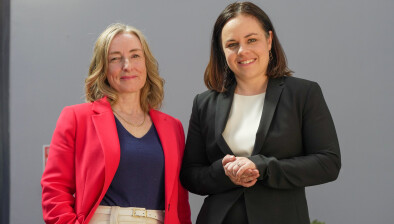Programme for Government to focus on economic growth and innovation

First Minister Humza Yousaf
First Minister Humza Yousaf has laid out a comprehensive Programme for Government aimed at boosting Scotland’s economic growth, supporting small businesses, and combatting poverty.
The programme includes 14 new bills focusing heavily on social welfare measures such as tenants’ rights, free school meals, and increased social security payments. The First Minister confirmed his intent to introduce a 44% tax band for higher earners, affecting incomes between £75,000 and £125,140, as part of his broader strategy to fund public services and alleviate poverty.
Mr Yousaf also announced a £15 million plan to encourage innovation and entrepreneurship, which will bolster existing initiatives like the Scottish EDGE and the Scottish Ecosystem Fund. The First Minister pledged to work more closely with the business community and to explore tax incentives to drive investment in key sectors, particularly renewables.
This is in line with recommendations from the New Deal for Business Group and the Hunter Foundation. His government is also seeking to halve consenting time for new section 36 wind farms.
In the housing sector, a £750m investment is planned to provide affordable homes, along with £60m for converting empty properties into affordable housing. Additional bills include a Cladding Remediation Bill, replicating the UK government’s Building Safety Levy, and a Land Reform Bill to increase transparency in land ownership.
Tracy Black, director of CBI Scotland, welcomed the emphasis on economic growth and public services.
She said: “Additional support for childcare is particularly welcome as it not only helps working parents, but makes retaining and recruiting staff easier for firms crying out for talent. This is an important step towards addressing two longstanding challenges for the Scottish economy – reducing economic inactivity and tackling sluggish productivity.
“Cutting lead-in times for planning consent for offshore wind and other net zero projects represents a win for those firms betting on the green economy.
Ms Black continued: “While there was welcome recognition for the contribution of some of Scotland’s most globally competitive businesses, particularly in high value sectors such as energy transition, questions remain about how to unlock stalled investment.
“We urgently need government to work with business to create a long-term competitive tax strategy, and remove regulatory barriers to drive inward investment.”
Andrew McRae, FSB Scotland Policy Chair, added: “There’s obviously a bit to unpack in here – not least the new £15 million package of measures to back entrepreneurs, start-ups and scale-ups.
“Our Big Small Business Survey found that over half of small businesses don’t believe there’s enough support to start your own business in Scotland, so we look forward to working with government and enterprise agencies to ensure support is meaningfully ‘transformed’ – as he put it – to better fit entrepreneurs’ needs.”







